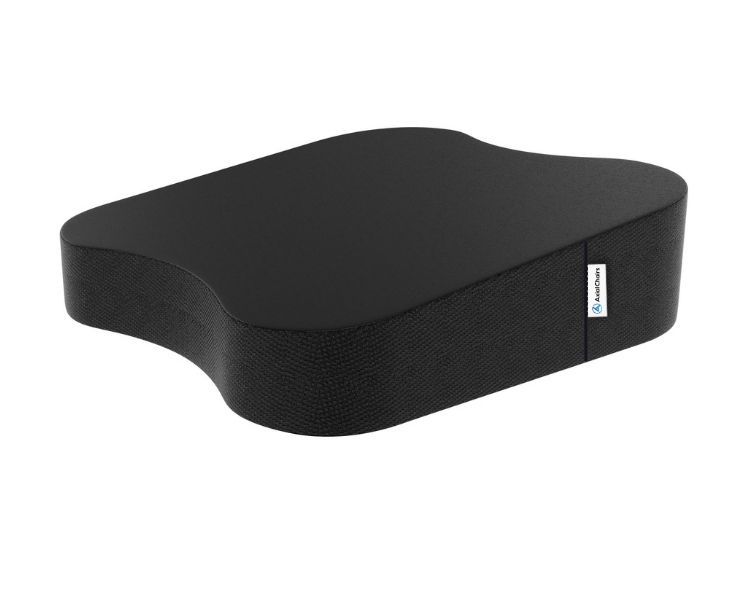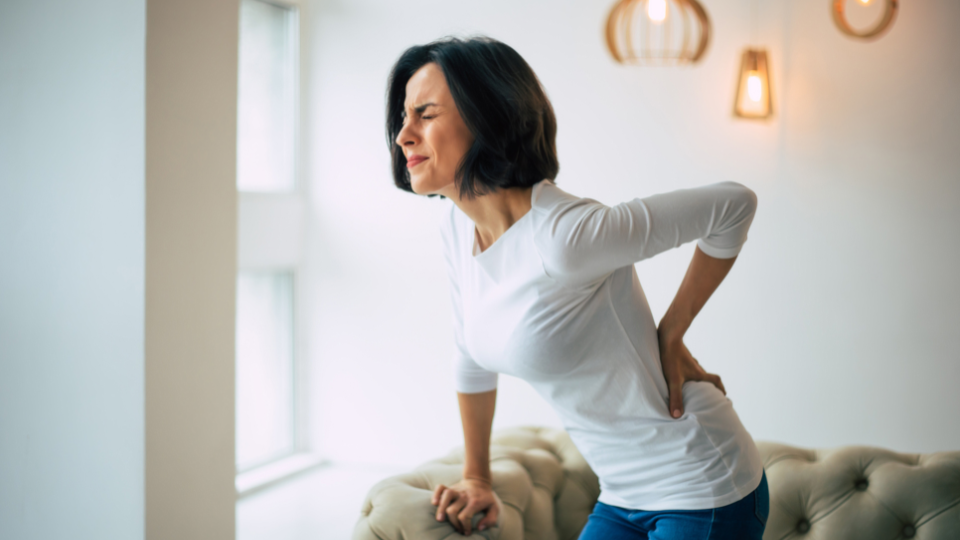Are you dealing with persistent back pain and finding that it gets worse when your bladder is full? Well, if so, then you’re certainly not alone. Back pain can be an incredibly frustrating condition that often leaves us feeling helpless. And the fact that seemingly innocuous activities like filling our bladders can actually make matters worse doesn’t help the frustration either. In this blog post, I’m going to take a deep dive into why it happens and what we can do to ease – or even prevent – the discomfort associated with this phenomenon. So keep reading as I walk through some tips on how to manage back pain when your bladder is full!
As a general rule, since the bladder and kidneys are in the lower abdomen, close to back muscles and nerves. Bladder issues may cause back pain, while back muscle/spine/nerve problems can impact the bladder and cause incontinence.
All Day Comfort & Support
Axial Ergonomic Seat Cushion® | Seat Chair Wedge
Quick Guide: A 30-Second Summary

All Day Comfort & Support
Product Name
Axial Designs™ Seat Cushion
Price
$149
Warranty
1 Year
Type
Posture Wedge
Top Layer
100% Natural Latex (Molded)
Bottom Layer
High-Density Foam
Top Material
Isometric Grippy Vegan Leather
Bottom Material
Non-Slip Material
Side Material
3D Breathable Fabric
What Causes Back and Bladder Pain?
Back and bladder pain can be caused by a variety of medical issues. It could be due to a urinary tract infection, kidney stones, prostate problems, or even bladder cancer. Low back pain can be caused by inflammation or nerve damage in the spine, which can lead to back and bladder discomfort.
How Does Low Back Pain Interact with Urinary Symptoms?
Low back pain and urinary symptoms often work together. For example, if the nerves in your spine become compressed or damaged from an injury or illness, they may cause both back pain and urinary symptoms such as frequent urination or difficulty controlling urine flow (urinary incontinence).
How Does Spine Health Affect Frequent Urination?
Spinal health is also important when it comes to frequent urination. If your spine is not properly aligned or has weakness in certain areas, it can put pressure on the nerves that control your bladder’s ability to store urine until you are ready to go to the bathroom. This could lead to increased frequency of urination and other related problems such as lower back pain and abdominal discomfort.
Can Spinal Stenosis Contribute to Bladder Discomfort?
Yes, spinal stenosis can contribute to bladder discomfort. Spinal stenosis is a condition where the spine becomes narrowed due to arthritis, injury, or other causes. This narrowing of the spinal canal puts pressure on the nerves that control bladder function leading to symptoms such as frequent urination and low back pain.
All Day Comfort & Support
Axial Ergonomic Seat Cushion® | Seat Chair Wedge
Quick Guide: A 30-Second Summary

All Day Comfort & Support
Product Name
Axial Designs™ Seat Cushion
Price
$149
Warranty
1 Year
Type
Posture Wedge
Top Layer
100% Natural Latex (Molded)
Bottom Layer
High-Density Foam
Top Material
Isometric Grippy Vegan Leather
Bottom Material
Non-Slip Material
Side Material
3D Breathable Fabric
What Are the Signs of Cervical Spinal Issues and Urinary Problems?
The signs of cervical spinal issues causing urinary problems include lower back pain radiating into the legs, frequent urination with urgency, difficulty starting a stream of urine, feeling like you cannot completely empty your bladder after finishing urinating, decreased force in the urine stream or dribbling at end of the stream, and pelvic discomfort after long periods of sitting or standing.
Treatment Options for Back, Bladder and Spinal Cord Issues
Treatment depends on what is causing the problem; however, some options include physical therapy exercises to strengthen core muscles and improve posture as well as medications for inflammation reduction/pain relief depending on the cause of discomfort. Surgery may also be an option if there is nerve entrapment contributing to symptoms such as severe lower back pain radiating into the legs alongside frequent urination issues.
Why does my back hurt when I need to pee?
This type of lower back pain may be due to nerve compression in the spine which affects both bladder control and sensation in your body’s muscles leading to tightness and discomfort when needing to pee urgently.
Is it normal to feel pain when the bladder is full?
It depends on what is causing the symptom; however, it could potentially be indicative of an underlying urinary issue such as a urinary tract infection or kidney stones so it would be wise to seek medical advice if this persists over time.
Why does my upper back hurt when I have to pee?
It could be due to pressure on nerves and other structures around the bladder, such as the spine and muscles, caused by an overly full bladder. It can also be caused by urinary tract infections which can lead to inflammation and irritation of nerves in the lower back area resulting in back pain. Additionally, if you have kidney stones, they can cause pain either in your abdomen or your lower back as the urine passes over them – leading to discomfort when your bladder is full.
Is it normal to feel pain when the bladder is full?
Yes, it’s possible that you may feel some discomfort or sharp pains in your lower back or abdomen when your bladder is full, especially if you are prone to urinary tract infections or kidney stones. However, if this feeling persists or gets worse then it’s recommended that you seek medical advice from a urologist as soon as possible – as there may be an underlying condition causing the discomfort.
Why does my upper back hurt when I have to pee?
This could be caused by nerve compression in the thoracic spine region due to an enlarged bladder pressing against surrounding structures such as muscles and ligaments – causing pain and discomfort. Alternatively, an infection of the kidneys or urinary tract may also be contributing factor causing pain radiating from your upper back and down towards your abdomen area – signifying that something else needs medical attention beyond just needing to pee urgently!
Why do my kidneys hurt after holding my pee?
This could be because of dehydration leading to decreased urine output creating concentrated urine which can irritate and inflame the lining of the renal pelvis – resulting in kidney pain upon urination even after holding it temporarily. Urinary tract infections can also contribute towards painful urination regardless if one holds their urine or not, so having these conditions ruled out by a urologist should definitely be done if these symptoms persist!
Back Pain Warning Signs
While some back pain can be managed with self-care, others require medical attention. Certain warning signs indicate the need for prompt medical intervention, including a fever accompanying the pain, numbness in the groin area, sudden leg weakness, loss of bladder or bowel control, inability to find a comfortable sitting or standing position and increasing pain rather than relief.
Summary
Having both back pain and bladder problems can be a tricky mix. It’s important to keep in mind that these two concerns can often be related, so if you have both, it would be wise to speak with a healthcare professional about potential treatment options. Additionally, there are lifestyle changes you can make to help reduce or relieve both back pain and bladder issues. For instance, making sure to drink enough water each day, strengthening your core muscle groups with simple exercises and stretching out tight muscles regularly may all help improve symptoms. Although having both conditions can be difficult to manage, it is possible to find ways to live comfortably with the right care and attention. Ultimately, it is important to get appropriate medical care when needed and communicate openly with healthcare professionals about your concerns regarding any related physical discomforts you may experience.





